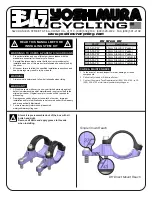
38
Tech
Bicycle suspension
Failure to maintain, check and prop-
erly adjust the suspension system may
result in suspension malfunction, which
may cause you to lose control and fall.
If your bike has suspension, the increased
speed you may develop also increases your
risk of injury. For example, when braking,
the front of a suspended bike dips. You
could lose control and fall if you do not
have experience with this system. Learn
to handle your suspension system safely.
See also “Brakes” on page 30.
Changing suspension adjustment can
change the handling and braking char-
acteristics of your bicycle. Never change
suspension adjustment unless you are
thoroughly familiar with the suspension
system manufacturer’s instructions and
recommendations, and always check
for changes in the handling and brak-
ing characteristics of the bicycle after
a suspension adjustment by taking a
careful test ride in a hazard-free area.
Suspension can increase control and
comfort by allowing the wheels to better
follow the terrain. This enhanced capability
may allow you to ride faster; but you must
not confuse the enhanced capabilities of
the bicycle with your own capabilities as
a rider. Increasing your skill will take time
and practice. Proceed carefully until you
have learned to handle the full capabilities
of your bike.
Not all bicycles can be safely retrofi tted
with some types of suspension systems.
Before retrofi tting a bicycle with any
suspension, check with the bicycle’s
manufacturer to make sure that what
you want to do is compatible with the
bicycle’s design. Failing to do so can
result in catastrophic frame failure.
















































